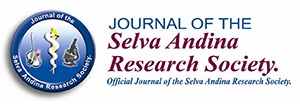

World heat impact and its importance for Latin america
El impacto del calentamiento global, su importancia para América Latina
Journal of the Selva Andina Research Society, vol.. 5, no. 1, 2014
Universidad Católica Boliviana San Pablo


Editorial
At present, there is a universal concern related to the origin and consequences of world heat (WH) on the development of urban human communities as well as those who live at the country side regarding its dependence for fossil fuels, which are supporting city transport, industry and progress of the main urban populations of the world. In addition, there is a lack of respect for preventive rules related with soil changing use which is causing disorganized urban growth and destroying its green areas or lungs, as well as surface and underground water recharging. The above mentioned includes conventional and common agriculture based in applying chemicals like inorganic fertilizers and pesticides which cause environmental pollution.
Concerning public health, WH has changed the natural distribution of vector insects of human diseases which are increasing the zones of impact. In the past, its biological cycles were limited by seasonality, today it is a problem during the 12 months of the year. An example of this are diseases transmitted by insect Diptera belonging o Aedes genus which makes the worse pandemic diseases such as malaria, dengue fever and chikungunya, etc.
Similarly occurs with plagues and vegetal diseases which complicate its prevention increasing cost to control them in order to keep a sustainable agronomic production. At the same time, the anachronistic models of animal production contribute to the generation of greenhouse gases.
Added to the above, are the poor environmental and formal education schemes in Latin-American countries which have not been changed according to the needs of a globalized world.
This is an apocalyptic view due to the loss of natural resources and depredation as a consequence of poverty, misery, diseases and social unbalance. This unlucky reality in Latin-American has been showed in some science fiction films, like the well known “The solyent green”. However there is a hope for environment and natural resources in our countries necessary for its surviving and progress, the challenge is not easy for governments and society as a whole.
One of the most important issues in the world and Latin-American is to fight back all those problems caused by WH applying schemes in high education with specialized professional careers to apply corrective and preventing actions, at local, national and international level, improving graduate programs to connect research group from developed countries to developing ones. Besides those actions supported by the unlimited information advanced power in a way that never before happened in human evolution history never imagined. An example of this are scientific specialized journals as like is Journal of the Selva Andina Research Society (JSARS) which originally was only available in specific Latin-American countries with limited level of broadcast. Now almost each nation of the hole region publish this type of Journals which are an indicator of advanced high education models of research in several knowledge areas specifically related to environmental, agriculture, health, management and preservation of natural resources. In that sense, JSARS even though it is relatively new consolidates as a reliable information source to get know causing and consequences of WH in the American continent, acting as bridge among countries facing similar problems, which includes exchange possibilities between its investigators. Also agreements for improving each of what one tries to do as much as possible to solve the main challenges to support and plan university specialized career programs and research projects related to direct or indirect to WH in order to adapt them to each.
It is logical to assume that JSARS and other specialized scientific journals are not the only solution for all the problems described but there is a chance for several research groups in Latin-American to join and exchange experiences which enforces by the work done to reverse further damage by WH in Latin-American. Regarding common aims as well as reducing WH negative effects by trying specific actions to decrease natural resources lost that are increasing population poverty, misery and disease. Finally, this is a calling for investigators Castilian spoken including other languages of the world to publish their research work in JSARS. This journal is perhaps just a grain of sand against lost of environmental and human quality life, but definitely more than indolence and apathy showed for so long which does not help improve our lives.
Juan Manuel Sánchez-Yáñez
Laboratorio de Microbiología Ambiental
Instituto de Investigaciones Químico Biológicas
Universidad Michoacana de San Nicolás de Hidalgo
Medellín, Colombia
México. Tel. 01 (43) 3 26 57 88.
syanez@umich.mx
2014. Journal of the Selva Andina Research Society. Bolivia. All rights reserved.

